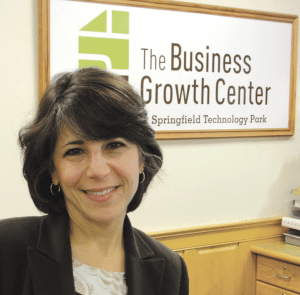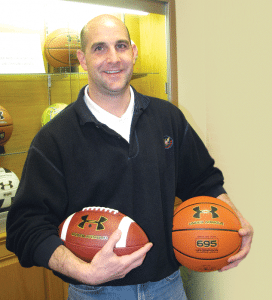
Raising Their Game
Business Growth Center Lives Up to Name Change

Director Marla Michel says the name change from the Scibelli Enterprise Center to the Business Growth Center represents a sharpening of the facility’s mission.
“Being a business owner can be very lonely and scary, and sometimes, even with your peers, you don’t want to let your hair down, to let your guard down,” she said. “You always have to project confidence as a business owner, because nobody wants to buy a product from a non-confident business owner.”
But that’s no excuse not to seek help when it’s needed, Michel added. As director of the Business Growth Center at the Springfield Technology Park, she’s been busy expanding the center’s programs, including its mentoring outreach to business owners.
“The way we do mentoring is, I build a team of professionals — three or four people who have experiences and skills and connections in areas relevant for that business owner — and we meet on a regular basis, anywhere from six to eight to 10 weeks, depending on where the company’s at; younger companies tend to need to meet more often.
“And we dialogue,” she continued, “about things that, for lack of a better word, are keeping the owner up at night. If we need to bring in other competencies and skills not on the team, we do. We allow it to be flowing because we have resources we can pull in at different times. And this development team serves as an informal advisory board for entrepreneurs and business owners.”
But for a mentoring program to work, she said, the business owner has to be honest and willing to accept advice.
“These mentoring teams allow a business owner to be himself or herself, and receive advice from people who know what they’re talking about, whether it’s an insurance expert, lawyer, accountant, or operations expert. Getting advice at the right time is very helpful, and time is money,” Michel said. “But, again, a company owner has to be willing. It’s easier to implement when you’re the kind of person who recognizes you don’t know it all.”
The fact that the Business Growth Center positively teems with knowledge, from the array of economic-development organizations, small businesses, and other agencies that populate the center, is one of its key strengths, she noted, and one that the center is actively marketing, not just to lease space at the center, but through a series of new programs and outreaches aimed at helping small businesses throughout the region grow and thrive.
To reflect that emphasis, what was originally called the Scibelli Enterprise Center — named for former Springfield Technical Community College President Andrew Scibelli, who shepherded the development of the Technology Park — changed its name to the Business Growth Center in October, although Scibelli’s name will continue to grace Building 101 in the complex, where the center is located.
“We felt that, for the program to reach its full capacity, we needed to change the name and embellish some of our programming,” Michel said. “The name ‘Business Growth Center’ speaks to businesses more than the Scibelli Enterprise Center. Now, the Business Growth Center is still a destination for space, but also a destination for programs, a destination for business owners to come when they’re thinking about growing.”
And that’s exactly what they should be thinking about, Michel said. “There was a growth study done by the UMass Donahue Institute that reinforces the reality that our region is dominated by very, very, very small companies, and they don’t know how to access capital.”
Why is that important? Consider the probability that MGM Resorts International will soon break ground on an $800 million casino in Springfield’s South End.
“If you have an operator like MGM that publicly says that, if it’s awarded a casino, it wants to commit $50 million to local businesses, you have to ask the question, do we have businesses that can bid on $50 million of business?” Michel asked. “Stated another way, can we keep that $50 million here? So we need to make sure that the companies that will bid for work for the casino have that capacity.”
In many ways, the facility is doing just that. In this issue, BusinessWest examines the changing face of the Business Growth Center, and the many ways in which it’s living up to its new name.
Growth Patterns

Dan Tuohey says locating at the center and accessing its resources has been a factor in the growth of psi 91.
“We had been thinking a lot about where we wanted to go, and that accelerated the conversation about our community mission,” she said. “The Technology Park, although it was created to support the community in the interests of the college, didn’t have the programming — just the space.”
So the conversation turned to boosting the programming offered by the center. “This is a real opportunity for the Technology Park to expand its mission of economic development beyond creating space for good jobs, which is a very good component of economic development, to adding programming to support the growth of businesses implicitly.”
The new offerings include the Stronger Businesses program, an eight-week initiative aimed at leaders of both for-profit and nonprofit enterprises. Each week’s three-hour session focuses on a specific area — from growing a self-sustaining customer base to focusing on the right products and markets — with the goal of helping participants assess their operations, gain new tools for solving problems and pursuing opportunities, and better align their operations, marketing, human resources, and executive management. A new series of sessions begins Jan. 7.
“This is a great example of the state’s embrace of the new Business Growth Center,” Michel said. “We received a grant from the Mass Growth Capital Corp. to help fund this program to help companies build capacity through self-assessment and learning about strategic marketing and operational improvements.”
Then there’s Capacity Building for Growth, a two-day workshop (next dates: Jan. 21 and 28) that helps small businesses develop core skills for scaling up their companies, as well as learning how to secure contracts from larger corporations — all with the goal of increasing small-business activity in Greater Springfield while helping company owners move to the proverbial next level.
“We did a lot of research,” Michel said regarding all the new initiatives. “We didn’t just say we’re going to do this. We talked to Babson College, talked to the Federal Reserve, talked to many of our community partners, and we looked at our community and our organizations that were already here in our building. We have great service providers doing a lot of good work.”
The new mentoring program is one way to leverage those assets for the benefit of the community.
“To have the kind of economic impact we’re hoping to, we had to reach more than just companies located here at the center,” she said. “For those not based here, we give them access to the best assets of the building, from the huge conference-room space to the community itself.”
The mentoring program has helped a range of companies at various stages of growth, she added, from those who haven’t yet seen revenue to growing firms that mentors have encouraged to tap new markets.
“Others need a legal sounding board,” she noted. “It’s not legal advice, but it helps you prepare for when you talk to professionals, so you ask better questions, so you have thoughts about things you didn’t have thoughts about beforehand. In some cases, it helps you make decisions, but it’s always your decision.”
Space Program
Of course, while the Business Growth Center works to expand its programming, its tenant space continues to be a key asset. Current tenants range from small-business training and counseling entities (including the Mass. Small Business Development Center Network, the U.S. Small Business Administration, New England Business Associates, SCORE, and the National Assoc. of Minority Contractors) to well-established businesses (such as Square One and the Achievement Network) to incubator tenants, or small businesses at various stages of getting off the ground.
Dan Tuohey joined the incubator in 2010 to launch his company, psi 91, which develops and distributes products for sports apparel maker Under Armor. That manufacturer’s foray into inflatable balls for various sports has given psi 91 myriad opportunities to grow, and being in the Business Growth Center has helped the startup — now boasting eight employees — do just that.
“It’s been a great benefit,” Tuohey said. “Before we were a revenue-generating business, we were meeting in conference rooms here, planning our launch. Marla was really helpful to us at that stage. We were taking our meetings from Dunkin’ Donuts and Panera Bread to an actual office environment.”
In addition, he said, “Marla put together a great advisory staff for us to meet with quarterly, area business executives to bounce ideas off — and shoulders to cry on when needed.”
Since its inception, psi 91 has gradually needed additional space, so it expanded into an adjoining suite to double its square footage. “That went very smoothly for us. We can use the conference room, too. It’s just a great place for a company our size as we have our initial growth.”
With space still available, Michel and her team are actively recruiting businesses and organizations to locate at Building 101, promoting both the physical space and amenities (including a state-of-the-art fiber-optic network), but also the community of economic-development resources that has given the center its reputation. More details are available at www.businessgrowthcenter.org.
“The park makes the region’s fiber footprint possible, and our collection of tenants enhances regional workforce and economic development,” said Ricky Swaye, chairman of the STCC Assistance Corp. board, which owns the Technology Park. “The Business Growth Center is a natural extension of our mission.”
Bottom Line
The overarching goal, Michel reiterated, is to help businesses — both inside and outside the Business Growth Center — succeed and expand, thereby raising the economic health of the entire Pioneer Valley.
“It’s really those businesses under 10 people that don’t quite have the capacity,” she said. “What I always like to say is, we need more medium-sized businesses here in the Valley. When we believe businesses contribute to our economic prosperity, they do it by employing people and paying taxes, but also through their philanthropic activity. If we have all tiny companies, they don’t have the capacity to give back to the community.
“We want to grow the next MassMutual, the next Smith & Wesson — well, maybe not on that scale, but we need to support our businesses so they can grow,” she continued. “We need to support them in learning how to be the acquirers as opposed to being acquired.”
After all, she explained, the main goal isn’t more large companies that are headquartered elsewhere, but businesses with deep roots in the Valley that grow, become significant employers, and maintain their local operations.
“We have family businesses that have been here for generations and generations, and all of a sudden the people who own the company aren’t here, and they don’t care as much,” Michel concluded. “I think we really need to support our small businesses and help them grow. It’s a cultural thing — we need to teach them that growth doesn’t have to mean greed. Growth is good.”
Joseph Bednar can be reached at [email protected]






